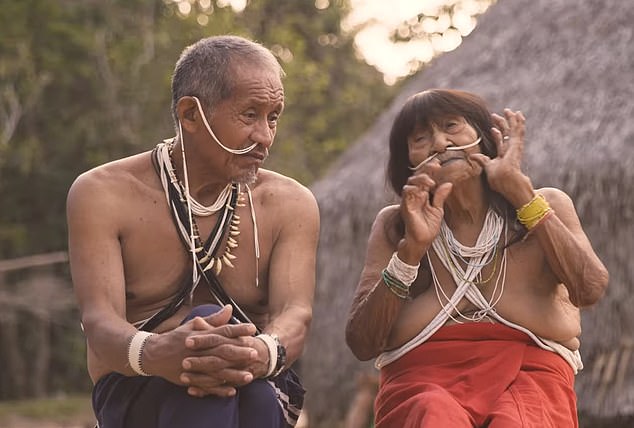
An indigenous Brazilian tribe has sued the New York Times over a report which claimed they had become addicted to porn after Elon Musk’s Starlink system gave them high-speed internet access.
The Marubo tribe from the remote Javari valley, who existed in small huts scattered along the Itui River for hundreds of years, filed a defamation lawsuit seeking at least £133million ($180million) in damages this week at a Los Angeles Court.
It also names TMZ and Yahoo as defendants, alleging their stories amplified and sensationalised the report for The Times and further tarnished the 2,000-member tribe.
The suit claims the June 2024 NYT story by reporter Jack Nicas on how the tribe reacted to the satellite service introduction ‘portrayed the Marubo people as a community unable to handle basic exposure to the internet, highlighting allegations their youth had become consumed by pornography’.
An amended version of the lawsuit filed on Thursday said the statements were ‘not only inflammatory but conveyed to the average reader that the Marubo people had descended into moral and social decline as a direct result of internet access’.
It added ‘such portrayals go far beyond cultural commentary’ and claimed they ‘directly attack the character, morality, and social standing of an entire people, suggesting they lack the discipline or values to function in the modern world’.
When Starlink was afforded to the Marubo tribe, they quickly discovered the incredible benefits the newfound technology had to offer.
Tribespeople could now call for help in emergencies, with medical helicopters able to reach the injured in a matter of hours rather than days.

An indigenous Brazilian tribe has sued the New York Times over a report which claimed they had become addicted to porn after Elon Musk ‘s Starlink system gave them high-speed internet access

The Marubo tribe from the remote Javari valley, who existed in small huts scattered along the Itui River for hundreds of years, filed a defamation lawsuit seeking at least £133million ($180million) in damages this week at a Los Angeles Court

Starlink satellite equipment is pictured outside the hut of one Marubo settlements in Brazil
It also allowed the remote community to connect instantly with relatives or friends camped dozens of miles further down the river, or even further afield.
Journalist Nicas travelled into the Amazon to visit Marubo villages and reported that tribal leaders had told him about the negative impacts the introduction of Starlink is having.
The leaders said it was making people become lazy, spending hours scrolling social media with teens hooked on graphic porn.
In his report, Nicas listed a range of issues apparently bought on by the tech: ‘teenagers glued to phones; group chats full of gossip; addictive social networks; online strangers; violent video games; scams; misinformation; and minors watching pornography’.
He added one tribal leader ‘is most unsettled by the pornography. He said young men were sharing explicit videos in group chats, a stunning development for a culture that frowns on kissing in public’.
Nica’s article does not mention porn anywhere else, but the shocking nature of the claim meant it was pushed to the forefront of follow up stories by other outlets.
One was from TMZ, who were also named in the lawsuit, which was accompanied by a video with the headline ‘Elon Musk’s Starlink Hookup Leaves A Remote Tribe Addicted To Porn’.
The suit claims the video ‘falsely framed the Marubo Tribe as having descended into moral collapse’.

The Marubo tribe from the remote Javari valley existed in small huts scattered along the Itui River for hundreds of years

Members of the Marubo tribe pictured testing a satellite dish to receive a Starlink connection

The 2,000-strong community quickly discovered the incredible benefits the newfound technology had to offer – but apparently, also discovered porn
‘The fallout from the publication was not limited to public perception. It destroyed lives, institutions, and culturally significant projects,’ it added.
Misconceptions brought on by the sensationalised re-telling of the story on other news platforms saw the NYT publish a follow-up, in which Nicas wrote: ‘The Marubo people are not addicted to pornography.
‘There was no hint of this in the forest, and there was no suggestion of it in The New York Times’s article.’
However, the tribe were unsatisfied with this as a response and in their lawsuit said the story ‘failed to acknowledge the role the NYT itself played in fuelling the defamatory narrative’.
It added: ‘Rather than issuing a retraction or apology, the follow-up downplayed the original article’s emphasis on pornography by shifting blame to third-party aggregators.’
Nicas claimed in his original story that he spent a week with the Marubo tribe, yet the lawsuit says he was invited for a week but spent less than 48 hours in the village.
Adding this was ‘barely enough time to observe, understand, or respectfully engage with the community’.
The plaintiffs also include two others who appeared in the NYT story – community leader Enoque Marubo and Brazilian journalist and sociologist Flora Dutra.

Shortly after the Marubo people were introduced to the pleasures of the internet, the perils quickly began to reveal themselves

Nicas claimed in his original story that he spent a week with the Marubo tribe, yet the lawsuit says he was invited for a week but spent less than 48 hours in the village

The lawsuit seeks at least £133million ($180million), including both general and punitive damages, from each of the defendants
Both played integral roles in bringing internet connection to the tribe and said it had many positive results, including facilitating emergency medicine and education for tribal children.
They said the TMZ video, which shows them setting up Starlink antennas in the village, as creating the ‘unmistakable impression’ that the pair ‘had introduced harmful, sexually explicit material into the community and facilitated the alleged moral and social decay’.
The lawsuit seeks at least £133million ($180million), including both general and punitive damages, from each of the defendants.
A spokesperson for the New York Times told the Associated Press: ‘Any fair reading of this piece shows a sensitive and nuanced exploration of the benefits and complications of new technology in a remote Indigenous village with a proud history and preserved culture. We intend to vigorously defend against the lawsuit.’
Enoque Marubo, 40, told Nicas the internet had transformed the once simple and technologically resistant way of life his people had observed for centuries.
‘It changed the routine so much that it was detrimental,’ Enoque admitted. ‘In the village, if you don’t hunt, fish and plant, you don’t eat,’ he said.
Meanwhile, Alfredo Marubo – all members of the tribe share the same last name – said the sudden exposure to pornography had precipitated a worrying rise in overt sexual behaviour in a culture where kissing in public is seen as shocking.
He said young men were not only sharing explicit videos in group chats, but that some prominent figures in the tribe had reported seeing more aggressive sexual behaviour from them.

Boats carrying Starlink products are seen arriving outside one Marubo settlement in Brazil

The Marubo people, who for hundreds of years has existed in small huts scattered along the Itui River in Brazil, were last year introduced to high-speed internet for the first time thanks to Elon Musk’s Starlink satellite programme
Alfredo also warned that, despite being more connected than ever before, members of the tribe had retreated from in-person social contact and had stopped speaking to their own families.
TamaSay Marubo, the first female to be granted a leadership role in the tribe, said that while social media had opened the eyes of young tribespeople to the world, it had also caused them to abandon their responsibilities in favour of spending hours on their smartphones.
Several members of the tribe said they were concerned the group’s traditions would be lost, and also expressed worry that the social fabric of the tribe was being infected by rumours circulating on group chats.
Others explained that some internet users had been subjected to abuse from strangers on social media and had fallen for unspecified scams.
Tribe elder Tsainama Marubo, 73, put it simply.
‘Things have gotten worse,’ she said.
‘Young people have gotten lazy because of the internet. They’re learning the ways of the white people.’
Starlink, an initiative launched by Musk under his company SpaceX, owns around 60% of the roughly 7,500 satellites orbiting Earth and is the dominant player in the internet satellite arena.
Its technology was first made available in Brazil in 2022, but only reached the more remote areas of the Amazon, such as the banks of the Itui where the Marubo people live, in April last year.
Enoque Marubo, who had ventured into cities and spent time away from the tribe, told the NYT he believed that achieving access to the internet could help his people share their experiences and communicate more effectively with the outside world.
He was one of the main tribal members responsible for getting in touch with outsiders and arranging the delivery of the Starlink system.
Enoque contacted Flora Dutra, a Brazilian activist who works with the Navi Global charity that aims to help indigenous communities in the Amazon access jobs, healthcare and other benefits, and involving them in projects that will impact the rainforest and their environment.
The pair managed to contact American philanthropist Allyson Reneau, who reportedly donated 20 Starlink units and worked with Navi Global to oversee their delivery to the Marubo.






